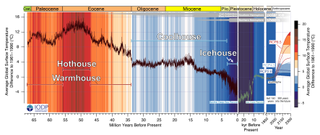“Berlin Now Has a City-Run Recycling Department Store”

In a bid to dramatically reduce waste, the Berlin government launched a facility in September that could be the first of its kind: a state-run department store that both sells items that might otherwise get thrown away and acts as an education center encouraging repair and reuse.
BP’s 2020 Energy Outlook

https://www.bp.com/en/global/corporate/energy-economics/energy-outlook/introduction/overview.html
The scenarios are not predictions of what is likely to happen or what bp would like to happen. Rather, the scenarios help to illustrate the range of outcomes possible over the next thirty years, although the uncertainty is substantial and the scenarios do not provide a comprehensive description of all possible outcomes.
- The Rapid Transition Scenario (Rapid) posits a series of policy measures, led by a significant increase in carbon prices and supported by more-targeted sector specific measures, which cause carbon emissions from energy use to fall by around 70% by 2050. This fall in emissions is in line with scenarios which are consistent with limiting the rise in global temperatures by 2100 to well below 2-degrees Celsius above pre-industrial levels.
- The Net Zero Scenario (Net Zero) assumes that the policy measures embodied in Rapid are both added to and reinforced by significant shifts in societal behaviour and preferences, which further accelerate the reduction in carbon emissions. Global carbon emissions from energy use fall by over 95% by 2050, broadly in line with a range of scenarios which are consistent with limiting temperature rises to 1.5-degrees Celsius.
- The Business-as-usual Scenario (BAU) assumes that government policies, technologies and social preferences continue to evolve in a manner and speed seen over the recent past*. A continuation of that progress, albeit relatively slow, means carbon emissions peak in the mid-2020s. Despite this peaking, little headway is made in terms of reducing carbon emissions from energy use, with emissions in 2050 less than 10% below 2018 levels.
“Earth barreling toward ‘Hothouse’ state not seen in 50 million years, epic new climate record shows”

https://www.livescience.com/oldest-climate-record-ever-cenozoic-era.html
Record goes back to the dinosaur extinction.
“Unilever will stop using oil and gas to make cleaning products by 2030”

https://edition.cnn.com/2020/09/02/business/unilever-fossil-fuels-cleaning-products/index.html
Unilever is spending €1 billion ($1.2 billion) to end the use of fossil fuels in the production of its cleaning and laundry brands.
Recent Comments